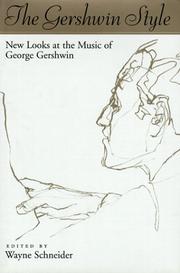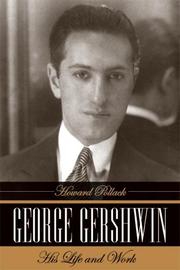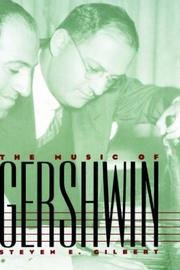| Listing 1 - 5 of 5 |
Sort by
|

ISBN: 1280760494 0195358155 9780195358155 9786610760497 6610760497 0195090209 9780195090208 0197727972 Year: 1999 Publisher: New York : Oxford University Press,
Abstract | Keywords | Export | Availability | Bookmark
 Loading...
Loading...Choose an application
- Reference Manager
- EndNote
- RefWorks (Direct export to RefWorks)
This collection of articles about George Gershwin touches on such topics of research as biography, source studies, analysis, and reception, and reflects the diversity of scholarship and thought regarding the Gershwins.
Music --- Criticism --- History and criticism. --- Gershwin, George, --- Gershvin, Dzh. --- Gershvin, Dzhordzh, --- Gershvin, Jacob, --- Gershwin, G. --- Hershvin, Dz︠h︡ordz︠h︡, --- Criticism and interpretation. --- Gershwin, George
Book
ISBN: 1283736195 0252093720 9780252078347 9780252093722 9780252093692 0252093690 9780252036651 0252078349 0252036654 9781283736190 9780252034442 0252034449 1283028972 9781283028974 9786613028976 Year: 2009 Publisher: Urbana : University of Illinois Press,
Abstract | Keywords | Export | Availability | Bookmark
 Loading...
Loading...Choose an application
- Reference Manager
- EndNote
- RefWorks (Direct export to RefWorks)
As a pioneer of the French New Wave, Jacques Rivette was one of a group of directors who permanently altered the world's perception of cinema by taking the camera out of the studios and into the streets. In this study, Wiles provides a thorough account of the director's career from the burgeoning French New Wave to the present day.
Rivette, Jacques, --- Criticism and interpretation. --- Composers --- Gershwin, George, --- Gershvin, Dzh. --- Gershvin, Dzhordzh, --- Gershvin, Jacob, --- Gershwin, G. --- Hershvin, Dz︠h︡ordz︠h︡,

ISBN: 1282359126 9786612359125 0520933141 9780520933149 0520248643 9780520248649 0520248643 9780520248649 9781282359123 6612359129 Year: 2006 Publisher: Berkeley : University of California Press,
Abstract | Keywords | Export | Availability | Bookmark
 Loading...
Loading...Choose an application
- Reference Manager
- EndNote
- RefWorks (Direct export to RefWorks)
This comprehensive biography of George Gershwin (1898-1937) unravels the myths surrounding one of America's most celebrated composers and establishes the enduring value of his music. Gershwin created some of the most beloved music of the twentieth century and, along with Jerome Kern, Irving Berlin, and Cole Porter, helped make the golden age of Broadway golden. Howard Pollack draws from a wealth of sketches, manuscripts, letters, interviews, books, articles, recordings, films, and other materials-including a large cache of Gershwin scores discovered in a Warner Brothers warehouse in 1982-to create an expansive chronicle of Gershwin's meteoric rise to fame. He also traces Gershwin's powerful presence that, even today, extends from Broadway, jazz clubs, and film scores to symphony halls and opera houses.Pollack's lively narrative describes Gershwin's family, childhood, and education; his early career as a pianist; his friendships and romantic life; his relation to various musical trends; his writings on music; his working methods; and his tragic death at the age of 38. Unlike Kern, Berlin, and Porter, who mostly worked within the confines of Broadway and Hollywood, Gershwin actively sought to cross the boundaries between high and low, and wrote works that crossed over into a realm where art music, jazz, and Broadway met and merged. The author surveys Gershwin's entire oeuvre, from his first surviving compositions to the melodies that his brother and principal collaborator, Ira Gershwin, lyricized after his death. Pollack concludes with an exploration of the performances and critical reception of Gershwin's music over the years, from his time to ours.
Composers --- Gershwin, George, --- Gershvin, Dzh. --- Gershvin, Dzhordzh, --- Gershvin, Jacob, --- Gershwin, G. --- Hershvin, Dz︠h︡ordz︠h︡, --- Gershwin, George, -- 1898-1937.. --- Composers -- United States -- Biography. --- autobiography. --- biographies and memoirs. --- broadway and hollywood. --- classical composer. --- comprehensive biography. --- famous composer. --- golden age of broadway. --- instrumental music. --- jazz clubs. --- jazz. --- music appreciation. --- musical trends. --- performing arts. --- pianist. --- surviving compositions. --- theater. --- tragic death. --- untimely death. --- warner brothers.
Book
ISBN: 9781139093132 1139093134 1107221196 1139088823 1283127512 9786613127518 1139092618 0511793294 1139092103 1139091212 1139090305 1107005051 1107655307 Year: 2011 Publisher: Cambridge : Cambridge University Press,
Abstract | Keywords | Export | Availability | Bookmark
 Loading...
Loading...Choose an application
- Reference Manager
- EndNote
- RefWorks (Direct export to RefWorks)
Traditionally, ideas about twentieth-century 'modernism' - whether focused on literature, music or the visual arts - have made a distinction between 'high' art and the 'popular' arts of best-selling fiction, jazz and other forms of popular music, and commercial art of one form or another. In Modernism and Popular Music, Ronald Schleifer instead shows how the music of George and Ira Gershwin, Cole Porter, Thomas 'Fats' Waller and Billie Holiday can be considered as artistic expressions equal to those of the traditional high art practices in music and literature. Combining detailed attention to the language and aesthetics of popular music with an examination of its early twentieth-century performance and dissemination through the new technologies of the radio and phonograph, Schleifer explores the 'popularity' of popular music in order to reconsider received and seeming self-evident truths about the differences between high art and popular art and, indeed, about twentieth-century modernism altogether.
Modernism (Music) --- Popular music --- Jazz --- Modernism in music --- Modernist music --- Musical modernism --- Style, Musical --- History and criticism. --- Gershwin, George, --- Holiday, Billie, --- Porter, Cole, --- Waller, Fats, --- Waller, Thomas Wright, --- Waller, Thomas, --- Porter, Koul, --- Holliday, Billie, --- Fagan, Eleanora, --- Holiday, Eleanora, --- McKay, Eleanora, --- Holiday, Billy, --- Lady Day, --- Gershvin, Dzh. --- Gershvin, Dzhordzh, --- Gershvin, Jacob, --- Gershwin, G. --- Hershvin, Dz︠h︡ordz︠h︡, --- Criticism and interpretation. --- Arts and Humanities --- Literature

ISBN: 0300062338 Year: 1995 Volume: *4 Publisher: New Haven ; London Yale University Press
Abstract | Keywords | Export | Availability | Bookmark
 Loading...
Loading...Choose an application
- Reference Manager
- EndNote
- RefWorks (Direct export to RefWorks)
Analyse musicale --- Musical analysis --- Muzikale analyse --- Analysis, Musical --- Analytical guides (Music) --- Hermeneutics (Music) --- Music --- Music analysis --- Music theory --- Music appreciation --- Analysis, appreciation --- Analytical guides --- Instruction and study --- Gershwin, George --- -Criticism and interpretation --- Musical analysis. --- Gershwin, George, --- Gershvin, Dzh. --- Gershvin, Dzhordzh, --- Gershvin, Jacob, --- Gershwin, G. --- Hershvin, Dz︠h︡ordz︠h︡, --- Criticism and interpretation. --- Criticism and interpretation --- Biografieën --- Muziekgeschiedenis --- Stijlstudies --- Muziekanalyses --- Amerika --- Noord-Amerika --- Verenigde Staten van Amerika --- Gerschwin --- 20e eeuw
| Listing 1 - 5 of 5 |
Sort by
|

 Search
Search Feedback
Feedback About UniCat
About UniCat  Help
Help News
News